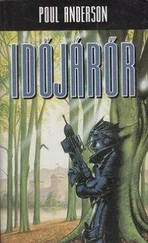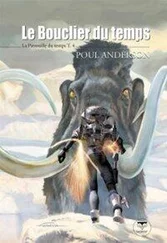“Banner,” Yewwl said aloud, each word a fog-puff, “do you know of any danger we might be in?”
Across hundreds of kilometers, the secret voice replied, “No. That doesn’t mean there is none, you realize. Your world is so different from mine—and so few humans have visited it, really, in all these centuries—and now everything is changing so fast—How I wish I could warn you.”
“Well, thank you, my oath-sister.” Yewwl told Robreng what she had heard. Decision came. “I think I grasp what the matter is. It’s within us—in me too. I remember how these parts were fair and alive when we were children; we remember caretakers, pilgrims, offerings and feasts and Oneness. Today we come back and find all gone dead and hollow. No wonder if dread arises.” She straightened in her saddle. “Strike it down! Onward!”
Ych crossed a root of the mountain and dropped out of sight. In a moment, his shout rang over ice and rock. He had spied the Shrine.
His kin urged their onsars to speed, from shamble to swing. Four massive legs went to and fro; sparks flew where hoofs smote rock. Between, the thick extensors did more than help support the body; they gripped, pulled, shoved, let go, seized hold afresh on the ground. Aft of the hump where saddles or packs were, dorsal fins wagged, black triangles as high as a rider’s head. Sweat gleamed on gray skin, sparse brown hair, big ears. Breath went loud, harsh, in and out of muzzles. Thews pulsed to the rocking motion.
Yewwl topped the ridge and glanced aloft. Sharply through the thin, clear air of the heights, she saw her goal.
The tomb of Kulembarach stood on a ledge a third of the way up the mountainside. It was a dolmen, rough granite slabs chiseled out of some quarry, somehow brought here and fitted together, in an age before iron. But around it, generation after generation had built terraces, raised houses and statues, nurtured exquisite gardens where fountains played and flutes replied. Here had been gathered the finest works of the clan and the best that traders abroad could bring home: pictures, jewelry, weavings, books, such awesome memorabilia as the Sword Which Held the Bridge, Amarao’s cup, the skulls of the Seven Heroes, the quern of Gro the Healer.
Today—
Nearing, Yewwl could barely make out the balustrades of the terraces, overflowed by snow. Frost had shattered several, and brought low a number of the sculptures which elsewhere stood forlorn as the stricken trees. When the last caretakers must depart or die, cold had numbed them into carelessness, fire had escaped a hearth, nothing but blackened stonework was left of the delicately carpentered buildings. Bereft of its wooden gate, the arch before the tomb gaped with horrible emptiness.
The onsars turned onto the road which led thither. It ascended too abruptly to be much drifted over, and the paving blocks were not yet sundered and tumbled and split, except in a few places. They rang under hoofs, answering the wind that wailed and bit and scattered a haze of dry ice crystals to shatter what sunlight came over the eastern shoulder into this darkling passage. Beyond the Shrine grounds the mountain rose steeper yet for a space, in a talus slope which clingplant had once made colorful but which was now only jagged and bleak. Above it, where the slope was easier, the snowpack began, that went on over the peak. It formed a white cliff, meters tall, mysteriously blue-shadowed.
Nonetheless … amidst the ruins, rearing over banks, upbearing what had fallen upon it during the night, the dolmen remained, foursquare. Kulem-barach abided, at watch over her people. To those who sought her, she would still give dreams and luck … or, at least, the strength that came from remembering that she had prevailed in her day, and her blood endured … Yewwl’s pulse thuttered.
Ych was already there. When no keepers were left, that had earned him the right to greet the Forebear on behalf of his party. He unslung the bugle at his saddlebow and put it to his lips. Riding around and around the tomb, he challenged desolation with the hunting call of his mother.
The snowcliff stirred.
A mighty wind rushed downward from it, smote like hammers, roared like thunder. Statues and tree boles toppled before the blow.
Earth shuddered. Hill-huge masses broke from the sliding precipice, flew, struck, smashed and buried what they hit. Behind them came the doom-fall itself.
Yewwl never remembered what happened. Surely she vaulted to a stance on her saddle and sprang from it, spreading her vanes, as if she were about to attack game on an open plain. Surely she went gliding, and she did not come down soon enough to be engulfed. Therefore surely she caught updrafts, rode the buffeting airs that the slide hurled before it, crashed bruised and bleeding but not truly wounded in her body, down onto a ridge above the path of destruction.
What she knew, at first, was nothing but a noise that should break the world apart, blindness, choked throat, tumbling well-nigh helpless—being tossed against raw rock and clawing herself fast while chaos raged—finally, silence, but for the ringing in her ears; and pain; and dazedly rising to stare.
Where the Shrine had been, the road, the onsars, her companions: snow filled the vale, nearly as high as she was. A mist of crystals swallowed vision within fifty meters; it would be hours in settling. Suddenly there was no wind, as if that also had been seized and overwhelmed.
“Robreng!” Yewwl screamed. “Ungn! Ych! Ngao!”
It took her hours of crawling about and shouting to become certain that none of them had escaped.
By then she was at the bottom of the slide, in the foothills under the mountain.
She staggered away. She would not rest before she must, before flesh and bones fell down in a heap. And then she would not be long a-swoon; she would rise again, again she would howl and snarl her sorrow, she would hunt and kill whatever stirred in the waste, because she could not kill the thing that had slain her darlings.
In Wainwright Station, Miriam Abrams slapped the switch of her multitransceiver, tore herself free of every connection to it, and surged from her chair. A calculator happened to be lying on the console shelf. She dashed it to the floor. It didn’t break as she wanted, but it skittered. “God damn them!” she yelled. “God damn them to the deepest hole in hell!”
The single person in the room with her was Ivan Polevoy, electronician, who had had some tinkering to do on a different piece of equipment. He had seen Abrams rapt in her rapport with the native, but not what was happening, for side panels effectively blocked his view of the video screen. The woman maintained that her relationship was sufficient invasion of privacy—though she admitted “privacy” was a notion hard to apply between unlike species. She herself spent incredible lengths of time following the life of her subject. The Ramnuan obviously didn’t mind, no matter how intimate events became. Possibly she’d not mind if other humans observed too. However, Abrams had made it plain from the start, a couple of decades ago, that she alone would receive the raw data. The reports she prepared on that basis were detailed, insightful contributions to xenology; but nobody else knew how much she chose to leave out.
The former chief of planetside operations had supported her in that policy. It was doubtless prudent, when little was known about Ramnuan psychology. Nowadays Abrams was the chief, so the staff didn’t object either. Besides, their own jobs or projects kept them amply busy, undermanned as the place was.
Hence Polevoy had to ask in surprise: “Damn who? What’s wrong, Banner?”
It was as if her nickname calmed her a little. Yet she had borne it for many years. Translated from the local language—wherein it derived from the flag which identified Wainwright Station at a distance to travelers—it had practically supplanted “Miriam,” even in her mind. At this hour, it seemed to tell her that dear ones died, but the race lived on.
Читать дальше











